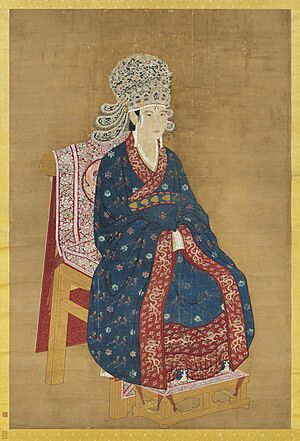Empress Xiang facts for kids
Empress Xiang (born 1047, died 1102) was an important Chinese Empress during the Song Dynasty. She was married to Emperor Shenzong of Song. Later, she helped rule China alongside her adopted son, Emperor Huizong of Song, in the year 1100. This role is called a co-regent.
Contents
Becoming Empress of China
Empress Xiang became the Empress to Emperor Shenzong in 1068. She had one daughter named Shuhuai, who was born in 1067 but sadly passed away in 1078. Even though she had her own child, as the Empress, she was considered the official mother of the emperor's other children. This included the future Emperor Zhezong of Song and Emperor Huizong of Song.
Empress Xiang During Emperor Zhezong's Reign
When her adopted son, Emperor Zhezong of Song, became emperor in 1085, Empress Xiang was given special honors. For a time, Emperor Zhezong's grandmother, Empress Dowager Gao, helped him rule.
Empress Xiang had a good relationship with her first daughter-in-law, Empress Meng. She admired Empress Meng for her education and good manners. Empress Xiang was upset when Emperor Zhezong removed Empress Meng from her position in 1096 after some false accusations. Empress Xiang later said that the order to remove Empress Meng, which was supposedly in her name, was fake. She claimed she had never even seen it.
In 1099, Empress Xiang helped choose wives for the emperor's brothers. In 1100, another woman, Consort Liu, became Empress. Empress Xiang did not approve of this. When Emperor Zhezong died in 1100, it was not clear who would be the next emperor. Empress Xiang gathered the officials and chose the next ruler.
Empress Huizong's Reign: Empress Xiang as Co-Regent
When her younger adopted son, Emperor Huizong of Song, became emperor in 1100, he was seventeen years old. He wanted his mother, Empress Xiang, to help him rule. This caused some discussion among the government officials. They needed to find a past example to make this co-rule official.
How Co-Regency Worked
In the past, an Empress Dowager had ruled when an emperor was too young. In those cases, the young emperor and the Empress Dowager would sit together behind a screen during meetings. The Empress Dowager's birthday was even celebrated like a ruler's.
Another example was when Empress Cao helped rule during Emperor Yingzong of Song's illness. In that case, the Empress Dowager was not treated like the main ruler. Her role was seen as temporary.
A government official named Zeng Bu suggested that Empress Xiang's co-rule should be like Empress Cao's. Empress Xiang agreed. She said she had not asked to co-rule. It was decided that she would not appear in the main meeting hall. She would also not be celebrated as the main ruler. Instead, officials would visit her after meeting the emperor to report on state matters.
Empress Xiang's Influence
During her time as co-regent, Empress Xiang mainly focused on palace matters. She met with government officials and shared her concerns. She even wrote a statement promising to step down once the funeral ceremonies for her late husband were finished.
Empress Xiang also used her power to support Empress Meng. She believed Emperor Zhezong had been wrong to remove Empress Meng. She declared that Empress Meng's removal was fake and that Meng should get her Empress title back. She also wanted Consort Liu to lose her title. This led to a disagreement with the officials. They argued that an emperor could not change the status of his late brother's widow.
A compromise was reached on June 23, 1100. Empress Xiang succeeded in getting Empress Meng's title back. However, she could not make Consort Liu lose her title. This meant Emperor Zhezong ended up having two Empress Dowagers.
Officials worried that Empress Xiang's influence was becoming too strong. When Emperor Huizong had a son, the officials told him he no longer needed a co-regent. Empress Xiang is seen as someone who wanted to keep things traditional. However, she successfully stopped attempts to remove a reformist official named Cai Jing from the government.
Empress Dowager Xiang stepped down from her co-regency role on June 1, 1100.
 | Roy Wilkins |
 | John Lewis |
 | Linda Carol Brown |


